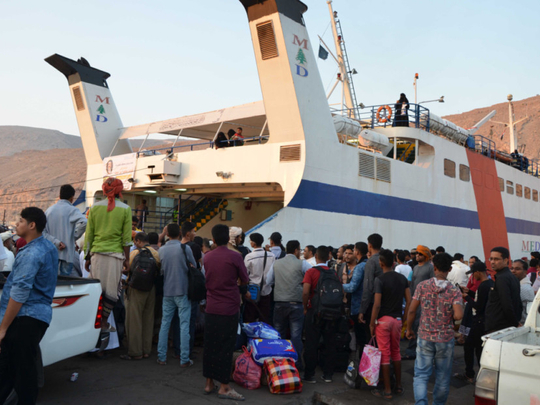
Al Mukalla: For many people on Yemen’s remote island of Socotra, the tragic drowning of a cargo vessel off the coast last year had a silver living; it brought home to decision-makers years of agony faced by residents to travel to and from the mainland.
In December, an overloaded cargo vessel carrying more than sixty passengers, bags of cement, marbles, and small boats capsized near the island. Commercial ships rescued nearly half of the passengers.
As local fishermen were searching for the missing passengers in the Indian Ocean, authorities in Al Mukalla, on the mainland, where the doomed vessel sailed from, stopped cargo vessels from leaving the seaport. The governor of Socotra took the same decision to avoid similar tragedies.
But the most noteworthy decision was inviting the Lebanese Med Dream -Passenger/Ro-Ro Cargo Ship to ferry the stranded people from and to the island. “When the pain stings you, you look for the medicine. We looked for the solutions when we lost our relatives,” Salem Abdullah, the governor of Socotra, told Gulf News.
The ship sails from Al Mukalla on Monday, comes back on Wednesday, and spends nearly 40 hours docked at the island’s seaport.
The owners of the ship boast high safety standards that never existed in the wooden vessels. “We have hundreds of life jackets and boats. The ship is guided by GPS.” one of the ship’s crew told Gulf News. It has the capacity of 500 passengers and can carry up to 370 tonnes of cargo.
Mounair Jouma’an came to Al Mukalla, the capital of Hadramout province, to treat his sick relative at local hospitals. He is one of hundreds of Socotrans who used to board unsafe wooden or fibreglass vessels from the island to Hadramout. “In the past, up to 40 people crammed into an overloaded vessel that was initially used to transport fish from Socotra to Hadramout,” he recounted. The vessels had no toilets, no food and lack basic safety standards. “We feel dizzy spells the moment we board it. Women and children had nothing to eat,” he said.
Jouma’an told Gulf News he had begun using a tourist ship to travel between Al Mukalla and the island. On this vessel, he can sleep, eat and have a good time. He added the government would not have realised how risky their voyages to the mainland were if the vessel had not sunk in December.
But despite showing satisfaction with the new vessel, Jouma’an and many others demanded cheaper tickets. “The tickets are still expensive. We pay 15,000 rials (Dh220) for a one-way ticket. People in Socotra make a living from fishing,” he said, suggesting that the income from the trade was modest.
When the cargo vessel capsized, the government, temporarily based in Aden, ordered the country’s two national carriers, Yemenia and Felix Airways to arrange weekly flights to the island. But the suffering persists.
The islanders often visited Al Mukalla for its health facilities and universities but the city’s airport has been closed since Al Qaida occupied it in April, 2015. The terror group has no been ousted from the city.
Despite having a free ticket as a Socotra-based employee of the Ministry of Health, Khoeled Abdullah complained that he had to travel for six hours from Seiyun airport, the second city in Hadramout, to Al Mukalla to attend a training course. “We want Al Mukalla airport to reopen. We only seek health services and study at educational facilities in Al Mukalla only,” Abdullah told Gulf News in Al Mukalla.
Local authorities initially pledged the city’s airport would be reopened in mid-January after finishing maintenance, but the airport is yet to open. “Now, if someone wants to travel to Al Mukalla for treatment purposes, they have to collect at least a million rials to cover the skyrocketing air tickets, accommodation, transportation and hospital expenses. We hope the government would treat us as Yemenis not overcharge us as tourists,” Abdullah said.
During the monsoon season that begins in May and lasts for five months, aggressive winds cut off the island from the rest of the world as they make it hard for the wooden vessels to sail from or to the island.
The governor said he raised this issue to the government in May and demanded the doubling of flights and hire ships that are strong enough to sail on choppy waters. “The island has an international airport that can receive flights at any time, even in the evening.” the governor said.
At Al Mukalla’s seaport, Salim Al Socotri, the island’s representative in Hadramout who receive and see off Socotrans who leave or arrive here and take their complaints to the authorities urged the government to subsidise flight and ship tickets to the “poverty-stricken Socotrans only. “ We demand special attention to the people of Socotra. We want cheap flights from Socotra to Al Mukalla airport.”












